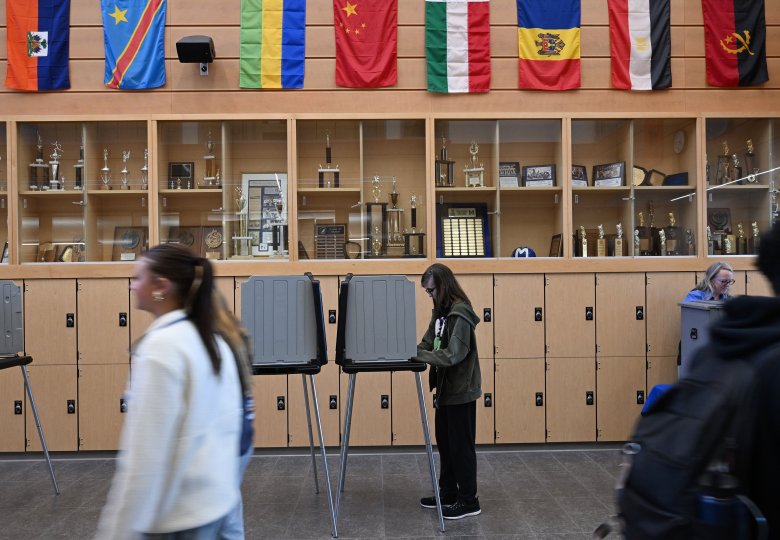Politics
Maine Students Cast Ballots in First Mock Referendum Election

Students across Maine participated in their first mock referendum election on March 5, 2024, as they engaged with the same ballot questions facing voters statewide. At Morse High School in Bath, students encountered two significant issues: a proposed “red flag” law regarding firearm confiscation and a measure requiring photo identification for voters.
While some students arrived at the polls with prior knowledge of the questions, others were learning about them for the first time. Sophomore Logan Corey noted that the second question about the “red flag” law was a topic of conversation among his peers. “I think it’s just a little bit on everyone’s minds,” he said. In contrast, many students expressed limited familiarity with the first question regarding voter ID, viewing it as less relevant to their immediate concerns.
Freshman Tim Brosnihan highlighted accessibility issues, particularly for elderly voters like his grandmother, who lacks a driver’s license. He voted against the ID requirement to ensure voting remains accessible for seniors.
This mock election, overseen by the Maine Secretary of State’s office, allowed each of the 78 participating schools to include the real ballot questions alongside an additional question regarding the relevance of the Declaration of Independence. This year marks a significant expansion of student engagement in the electoral process, as officials aim to cultivate a habit of voting among young people.
Secretary of State Shenna Bellows visited several schools, including Morse, emphasizing the importance of early voting practice. “We know that when students practice voting, they are more likely to vote,” she stated. Bellows, who is also running for governor as a Democrat, pointed to a recent surge in voter turnout in Maine, particularly among young voters aged 18 to 24.
At Morse High School, approximately a third of the student body, or 189 students, participated in the mock election. Preliminary results indicated that students voted ‘no’ on Question 1 and ‘yes’ on Question 2. Full statewide results are anticipated on March 6, 2024.
Historically, students in Maine have proven adept at predicting election outcomes. They voted in favor of the successful presidential candidate in every election since 2008, including the previous year’s election. In contrast, during the 2020 U.S. Senate race, students supported Democratic candidate Sara Gideon, while Republican Susan Collins ultimately secured victory.
Voting at Morse began to gain momentum as students arrived for lunch. They provided their names to poll workers before casting their ballots at official voting booths set up by the city. After voting, students received “I Voted” stickers as a reward for their participation.
Junior Willow Halpin, president of the Interact Club, which coordinated the mock election, observed a difference in enthusiasm compared to last year’s presidential election. “I think my peers have less solidified opinions on the questions,” she said. Halpin recounted an interaction where an upperclassman was confused about how to vote based on campaign signs he had seen.
To aid students in understanding the ballot questions, the Interact Club provided resources, including simplified explanations and a podcast titled Pine State Politics, created by Morse alumna Natalie Emmerson. For many participants, this mock election served as a valuable experience in civic engagement. “I’m just excited to see how it will actually be when I’m able to vote,” said junior Laura Kelley.
As Maine schools continue to foster a culture of voting, these mock elections play a crucial role in preparing students for future participation in democratic processes.
-

 Business2 weeks ago
Business2 weeks agoIconic Sand Dollar Social Club Listed for $3 Million in Folly Beach
-

 Politics2 weeks ago
Politics2 weeks agoAfghan Refugee Detained by ICE After Asylum Hearing in New York
-

 Health2 weeks ago
Health2 weeks agoPeptilogics Secures $78 Million to Combat Prosthetic Joint Infections
-

 Science2 weeks ago
Science2 weeks agoResearchers Achieve Fastest Genome Sequencing in Under Four Hours
-

 Lifestyle2 weeks ago
Lifestyle2 weeks agoJump for Good: San Clemente Pier Fundraiser Allows Legal Leaps
-

 Health2 weeks ago
Health2 weeks agoResearcher Uncovers Zika Virus Pathway to Placenta Using Nanotubes
-

 World2 weeks ago
World2 weeks agoUS Passport Ranks Drop Out of Top 10 for First Time Ever
-

 Business2 weeks ago
Business2 weeks agoSan Jose High-Rise Faces Foreclosure Over $182.5 Million Loan
-

 Entertainment2 weeks ago
Entertainment2 weeks agoJennifer Lopez Addresses A-Rod Split in Candid Interview
-

 Top Stories2 weeks ago
Top Stories2 weeks agoChicago Symphony Orchestra Dazzles with Berlioz Under Mäkelä
-

 World2 weeks ago
World2 weeks agoRegional Pilots’ Salaries Surge to Six Figures in 2025
-

 Science2 weeks ago
Science2 weeks agoMars Observed: Detailed Imaging Reveals Dust Avalanche Dynamics









